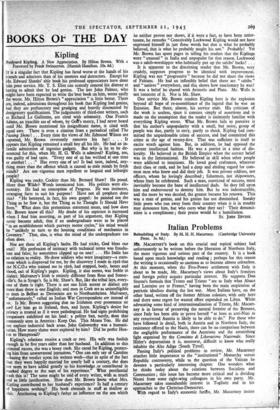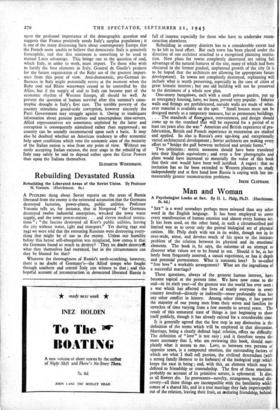Italian Problems
MR. MACARTNEY'S book on this crucial and topical subject had unfortunately to be written before the liberation of Northern Italy, the more vigorous and serious part of the country. It is a book based upon much knowledge and reading ; perhaps for this reason the writing is occasionally so cautious as to become almost colourless. At this moment, when the Five-Power settlement with Italy is about to be made, Mr. Macartney's views about Italy's frontiers and foreign policy acquire particular interest. He supports Don Sturzo's formula that Trento and Trieste " are to Italy what Alsace and Lorraine are to France," having been the main inspiration of patriotic idealists during the last war. Most Italians have, on the other hand, written off the former African colonies, with only here and there some regret for wasted effort expended on Libya. While advocating some kind of internationalisation of Trieste, Mr. Macart- ney is in favour of preserving the natural frontier of the Brenner, since Italy has been able to prove herself " at least as anti-Nazi as any resurrected Austria is likely to be able to do." For those who have followed in detail, both in Austria and in Northern Italy, the resistance offered to the Nazis, there can be no comparison between the negligible performance of the Austrians and the astonishing fight organised by the Comitato di Liberazione Nazionale. Since Hitler's deportations it is, moreover, difficult to know who really inhabits the Alto Adige (South Tyrol).
Passing Italy's political problems in review, Mr. Macartney attaches little importance to the " institutional " Monarchy versus Republic controversy, while to the question of the Vatican he devotes a particularly interesting chapter. One wonders what he thinks today about the relations between Socialists and Communists ; this issue has become more critical and is dividing Nenni from some right-wing colleagues in his own party. Mr. Macartney takes considerable interest in Togliatti and in his approaches to the Christian-Democrats. With regard to Italy's economic futere, Mr. Macartney insists upon the profound importance of the demographic question and suggests that France positively needs Italy's surplus population ; it is one of the many distressing facts about contemporary Europe that the French seem unable to believe that democratic Italy is genuinely francophile, and that this sentiment is something to be used to mutual Latin advantage. This brings one to the question of coal, which Italy, in order to work, must import. To those who wish to fortify the best elements in Italy; General de Gaulle's projects for the future organisation of the Ruhr are of the greatest import- ance from this point of view. Anti-democratic, pro-German in- fluences in Italy might potentially revive at the moment when the Ruhr coal and Rhine waterways ceased to be controlled by the Allies, but if the supply of coal to Italy can become part of the economic rhythm of Western Europe, all should be well. At present the question of human survival after this summer's catas- trophic drought is Italy's first care. The terrible poverty of the country stimulates grand-scale corruption, however sincerely the Parri Government may struggle against it. Owing to inadequate information about genuine patriots and unscrupulous time-servers, Allied representatives are sometimes exploited by the latter and corruption is consequently stimulated rather than suppressed ; no country can be soundly reconstructed upon such a basis. It may also be doubted whether an American tendency to offer economic help upon conditions which veto the economic aims of the majority of the Italian nation is wise from any point of view. Without too easily accepting Italian excuses, the next stage in the rebuild'ng of Italy may safely be said to depend rather upon the Great Powers than upon the Italians themselves.
ELIZABETH WISKEMANN.























 Previous page
Previous page